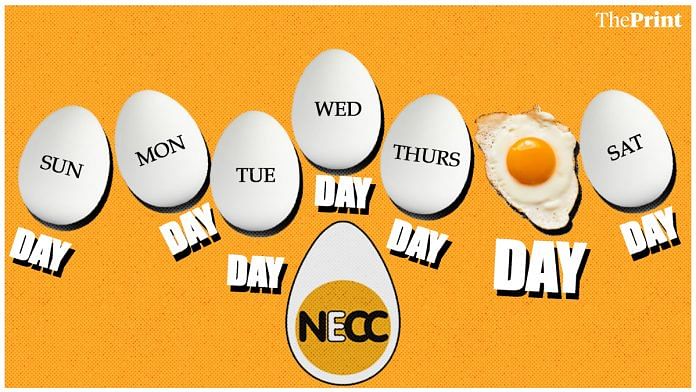What was the best nutritional advice ever given to Indians on television? ‘Eat chicken eggs.’ That suggestion came through a revolutionary ad campaign: ‘Sunday ho ya Monday, roz khao ande.’
The popular jingle from the 1980s instantly struck a chord with the middle-class families that aspired to eat healthy but were not sufficiently aware of the nutritional qualities of eggs.
Marketed as ‘the tastiest multivitamin capsule in the world,’ the National Egg Coordination Committee (NECC)’s campaign led the Indian society to prioritise nutrition over tradition, possibly for the first time.
“The advertisement impacted my father in an unusual way. We belong to a traditional south Indian vegetarian family. But to my amazement and my mother’s displeasure, my dad decided that I must eat an egg every day,” Bhavani Giddu, a communication professional, told ThePrint.
The television ads pitched egg as a ‘fun food’, which helps in the cognitive and physical development of a child. The advertisements claimed egg as “probably the only food on the planet to get a 100-point rating from the World Health Organisation”.
Also read: A multibillion-dollar race is on to replace the egg
The late 1980s also witnessed anti-egg campaigners, stoking rebellion against newspaper ads that asked people to eat eggs. In Pune, the Indian Vegetarian Congress launched a protest when marathon runners were given eggs before a race. Pro-egg campaigners were predominantly selling eggs to vegetarians, who had all kinds of food-related dogmas about eggs.
Also, a lot of Indians believed, and possibly still do, that one shouldn’t eat eggs in summer as they are “unhealthy” and can cause indigestion. Health experts have repeatedly denied these claims. Many people still don’t eat egg on certain auspicious days of the week. So, in a way, these pro-egg campaigns were also trying to break these long-held taboos.
The high-decibel ads screaming the nutritional value of eggs eventually started having an impact on Indian parents. “In the south, parents are very serious about the mental development of their child along with the physical development. My father wanted me to be academically successful. I was a teenager when the first campaign was launched (around 1983-84). It was the first time I was served a boiled egg with a hope that I will do well for myself in life,” Bhavani Giddu said.
New food–eaters
The advertisement by the NECC, an association of poultry farmers, became a benchmark for health campaigns, thanks to late Banda Vasudev Rao, the organisation’s chairman and the brain behind the campaign. Rao’s initiative eventually managed to achieve its objective – to increase the demand for eggs – after the poultry industry had suffered “an unprecedented crisis” around 1980-81.
“It has met both business criteria in achieving an increase in egg consumption, and creative acclaim by winning the Advertising Club of Bombay Campaign of the Year Award,” Anand Halve, ad-veteran and writer of the jingle, wrote in The Financial Express in 2009.
Also read: When you die, it won’t be an egg that killed you
For ad-maker Prahlad Kakkar, the campaign showed the power of well-made television advertisement. “It must not be an easy task for the ad-makers to turn people (into) non-vegetarians in a country like India,” Kakkar said.
“The campaign dismantled the belief that ‘egg’ is some ‘flesh’ and made people aware of its advantages. Itkind of became the co-operative movement in the poultry sector, supporting the poultry farmers. Egg eventually carved another section of food-eaters in the (Indian) society, which was neither vegetarian, nor non-vegetarian. They were eggitarians,” Kakkar added.
Then came the celebrities
The first campaign was shot with Dara Singh – the epitome of strength for the ’80s generation.
Other celebrities who joined the campaign later included cricketer Sachin Tendulkar and singer-actor Devang Patel. A few years later, Dara Singh returned to shoot another ad for the campaign. One of the recent ads featured badminton player Saina Nehwal.
All the NECC’s ads were focused on showing healthy, intelligent children, or a happy, healthy family eating eggs.
Also read: Why states chicken out when it comes to introducing eggs in mid-day meals
One of its print advertisements asked the readers to guess “the best square meal in the world”. “An egg a day. It could be the best way to round off a square meal. Have you had an egg today?” it asked.
The new ads also focused on a variety of dishes that Indians could make by tossing or scrambling eggs on the pan, apart from eating the popular but boring ‘boiled-egg’. The NECC’s print campaign – mainly targeted towards women – ran detailed recipes to make egg dishes such as egg chat, and informed readers about the nutritional value of eggs.
The power of the campaign was in the fact that people took the advertisements as ‘health advisory’. “It was strategically made to look like a public service campaign and not an advertisement,” said Santosh Sood, former chief operating officer at a marketing and brand consultancy firm Rediffusion Y&R.




At that time they used to give a free booklet of egg recipes. I wrote to them on a post card & got one.
In parallel, something else happened. Cholestrol put the fear of God into us. Suddenly, eggs, especially the yolk, became almost as much of a health risk as cigarettes. Have never quite gone back to them, although Parsis, who live the longest, are inordinately fond of them.